Funding a Long-Term Motorhome Tour, Buying a Dream
If you’ve a dream to quit work and head off into the great unknown for a few months, or even a few years, then a motorhome might just be the way for you to transform your life (it worked well for us). We all have a limited length of time on this Earth, and we all have the same delicate balancing act to pull off: how much to sit tight and graft, building up funds to support us, and how much to cut loose and travel, experiencing great landscapes, food, wine, architecture, people, wildlife, to squeeze the most from your life. Clearly, no-one can tell you how to make this choice, it’s an entirely personal one, but we can perhaps help a little with one critical aspect of it: how to pay for it. Nope, sadly we can’t actually pay your living costs, but we have a few years’ experience of funding our own long-term (sometimes full-timing, sometimes part-timing) travels, so we can offer some insight, both personal and second-hand.
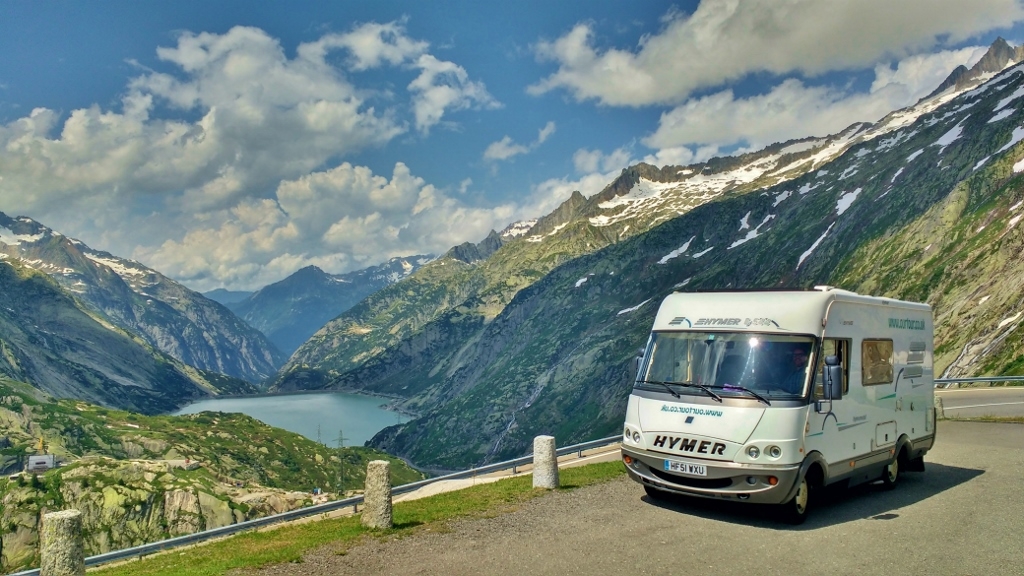
This blog post aims to share what we can of this knowledge in the hope it helps inform your choice. Everyone’s situation is going to vary widely, so we’ve created a few example scenarios below, just to give a few prompts on areas you might want to consider. We haven’t included a scenario for those with fixed income, from an annuity, final salary pension or the state pension for example. If you have a secure, inflation-adjusted ongoing monthly income, you’re quids-in, and you only need to ensure your income exceeds your costs – there’s a short section on costs below which might be of interest. If you’re not yet of pensionable age, or don’t have enough pension income to support your touring costs, then this blog post looks at some alternative arrangements you could consider.
Disclaimer
Please let me be clear: I’m not a financial adviser. I have zero training in finance or financial products. If you’re leaving work, or reducing your capability to work by travelling, or selling your house to fund your travels, then the decision is a very serious one, and shouldn’t taken based on just what some bloke on the ‘net (me) says. Please, please do your own research. Get a spreadsheet out and stick all of your costs and income in there. Consider what you’ll do if things go wrong (break-ins, break-downs, you not enjoying life in a motorhome and so on). Build an emergency fund as well as funds for your travels. Think and rethink. Trawl around the ‘net to get other people’s views on costs and income opportunities. While Ju and I have no regrets about our joint decision to quit our corporate jobs and change our lives, we’re in no position to guarantee the same result for you. That said, we’ve met folks out on the road, who now no longer breathe the Earth’s air. Only one of them knew they had a terminal illness, the others died unexpectedly. The opportunity to chase a dream might be a fleeting one, and if it’s something you very much want to do, you should be as serious about ensuring it happens as you are about pondering where the money will come from.
We no longer touring full-time in our motorhome (why?), but we’ve geared up our finances so we could do in future, if we decide to. If you’re interested in how we arranged our finances, we’ve written a free eBook called Funding Freedom, available on Amazon here, or for other ereaders or as a PDF on Smashwords.
How Much Does it Cost to Travel by Motorhome?
We’ve met folks who get through about £8,000 a year full-time travelling in a motorhome, and were even told by one couple who’d been travelling for several decades that they lived on £5,000 a year. No matter how efficient/tight/careful Ju and I are with money, we personally couldn’t get down to £5,000 a year, especially considering full-time insurance was over £1000 a year alone for us. We could probably manage on £8,000, but the lifestyle choices involved don’t match how we want to live. We’ve found we spend roughly £15,000 to £18,000 a year (including motorhome depreciation but excluding bricks ‘n’ mortar house bills) when travelling. Not everyone’s open with their costs (fair enough, it’s a bit like hanging out your dirty washing) but our feeling is we’re roughly mid-range, with most couples staying below £25,000 a year and having a great time into the bargain. There are more details on the typical costs involved in motorhome life in these blog posts, and in our book, The Motorhome Touring Handbook.

Scenario 1: Live Off Savings
Right, let’s go. This is the simplest financial scenario to consider: where you save up enough money to travel in a savings or current account or in premium bonds. Not that it’s easy to save up thousands of pounds, but the concept is simple and safe enough. The money is easily accessible and the aim is to just spend down what you have during your motorhome tour. Once the tour’s done, you’ll need to generate more income, perhaps by reaching the age at which you can access your private (currently 55) or state (currently 65) pensions, or by getting a job (or perhaps get seasonal work, see below).
Some points to consider in this scenario:
- Obviously you’ll need to save up enough to both (a) buy your motorhome and (b) cover living costs for however long you intend to travel.
- How much you spend on your van is up to you. We’ve never spent over £17,000 for a motorhome, and we buy them privately rather than through dealers.
- If you plan to travel long-term (several years) bear in mind your costs will slowly increase with inflation. Money in savings accounts won’t earn much in interest these days and, unless you’re very, very lucky, premium bonds won’t throw of much in terms of ‘winnings’.
- The longer you travel, the more you need to allow for kit replacement too: if you only go for a year your boots, jackets, camera, laptops, phone etc will most likely last you. Any longer and you’ll probably find you need to start buying new stuff.
- Having an ’emergency budget’ for stuff like your clutch, tyres or wheel bearings disintegrating (all happened to us) is worthwhile.
- We found we needed to also allow for money to ‘get us back into life’ in the UK, to pay for 6 month’s rent (our tenants wanted to stay in our house), to get our car back on the road and give us some breathing space while we looked for work. We could have sold our motorhome, that’s one way to do it.
- Exchange rate fluctuations can make reasonable-sized differences to costs of European tours: keep an eye on them as you save.
- If you own a house in the UK and opt to leave it un-rented, you’ll need to save up enough to also cover the bills. Also check your home insurance for clauses about how long you can be away and make some arrangements for someone to secure your home, open the post, check for leaks and so on. One option, particularly attractive if you have pets you want to leave at home, is to use a house sitting website for someone to stay in your house for the months you’re away. Multi-month house sits are rare though, so you may struggle to find suitable sitters.
Scenario 2: Sell Your House
This scenario assumes you own a house which has equity in it, and you’re willing to sell the house. Perhaps you want to generate enough money to enable you to travel, or you don’t want the worry and cost of an empty house in the UK for the months or years you’re away. If you go down this path, you’re clearly committing heavily to your travel plans. If you find you don’t enjoy long-term motorhome life (assuming you’ve not done it before) then your re-entry back home will be more challenging. Nothing is impossible of course and we’ve met folks who’ve chosen this option and were very happy with the result.
Some points to consider in this scenario:
- The obvious question is: are you going to use some or all of the capital you free up to fund your travels? If you will, and you intend/have to return to the bricks ‘n’ mortar life, you’ll have less money for a deposit when you return home (plus you might be jobless or starting a new job, making a mortgage impossible to get).
- If you don’t intend to spend down your equity, what will you do with it? If you keep it as cash or premium bonds, it will (probably) decrease in value over time as inflation outpaces interest/winnings. Some folks opt to invest in a smaller house/flat which they can rent out and maybe move into themselves in the future. This keeps them invested (to a lesser extent) in the UK property market, which may or may not be a good thing depending on what happens to house prices while they’re away.
- Where’s all your stuff going to go? You might be amazed at just how much of it there is, and how hard it is to get rid of! If you opt to store it, make sure you budget accordingly (you might end up paying more to store than your stuff is worth, we probably did).
- Your departure date will be tied in with whenever you can flog the house, which could be much sooner or later than you expect.
- You’ll need an address for contact by various folks – the DVLA, your insurance companies, your pension provider, HMRC and so on. Most folks use a relative or friend’s address, but there are some ‘virtual address’ services which can receive, scan and email paper correspondence (not everyone will accept a virtual address, the DLVA comes to mind).
Scenario 3: Rent Out a House
If you own your own home, or plan to sell and buy another property, you have the option to rent it out and use the income to fund some or all of your travels. This has the advantages of keeping you invested in the UK property market and giving you a home to return to in the UK.
Some points to consider in this scenario:
- Renting a house out isn’t a simple option, but done properly it can work very well. After all of our costs we see a long-term rental return of about 3% of the value of our property here in the English Midlands – so a £100,000 house (yes, you can buy them here) will create a pre-tax rental income of roughly £3000 a year, much less than the £5000 to £6000 gross income we might expect from just looking at zoopla.com and the like.
- There are legal implications of renting your house out. We opt to use a professional, local management agent to ensure we stay on the right side of the law and help to keep our tenants stay safe.
- You need to tell HMRC if you rent a house out, and probably complete self-assessment tax returns each year. If you spend months abroad, your agent will also need to let HMRC know so they can decide whether the agent has to deduct tax from your rent payments.
- Unless you live in a relatively new house, you may well have work to do on your house’s electrics, gas and fire alarm systems to bring them up to standard.
- If you have a mortgage on your house, you’ll need to contact the provider as they’re unlikely to let you simply let your house out without at least converting you to a more expensive ‘buy to let’ mortgage.
- You’ll also need to contact your home insurer to let them know your plans and ask if they have a suitable ‘landlord’s insurance’ policy you can move to (you may want to cancel your ‘contents insurance’).
- When you’re sat on a Greek beach a phone call to say the boiler’s gone on the blink can be a bit of a pain for all concerned. Our management agent has a network of trusted and known tradesmen who quickly take care of these issues for us. We pre-approve any issues costing less than £200, so small issues can be fixed without us even being contacted.
- Management agents can also do a good job of finding quality tenants and doing periodic checks, avoiding issues with non-payment of rent, maintenance problems and so on. Agents charge roughly 10% plus VAT of our rent income.
- Our advice if you’re thinking of renting would be to (a) use an agent you like and trust (b) treat your tenants like you’d want to be treated and (c) let your house unfurnished so you don’t get drawn into issues with the sofa being worn out, microwave oven breaking and the like.
- Again, where will all of your stuff go? We sold and gave away half our stuff and still had boxes and boxes of it to store in the attic (we got rid of almost all of it when we came home) or in a rented storage unit.
Scenario 4: Do Seasonal Work
If your funds aren’t enough to support continual work-less touring, or if you just want a sense of contribution or community for a few months of the year, then seasonal work might be for you. We’ve met a few couples who work as campsite wardens during the summer and travel in the winter. This isn’t something we’ve done personally, so please treat the information about this scenario below as second-hand knowledge only. I have however, returned to work as a contractor, this gave me the freedom to only work for a few months, then leave to travel again – this and other options might be available to you depending on your skill set and experience.
Some points to consider in this scenario:
- Most folks we met who worked as campsite wardens enjoyed it. One couple didn’t. They were working on a private site and didn’t feel they’d been given a fair picture of the work they were going to be expected to do, and left the gig after a few weeks. Some folks suggest getting a feel for a site by looking at reviews on ukcampsite.co.uk or similar, before applying for a job.
- If the seasonal work you do is during the summer, be aware that the weather in most of Europe isn’t good in the winter. If you’re planning on a skiing season or two, that’s not an issue. Otherwise you’ll need to head to the far south for decent-ish weather – southern Spain and Portugal, Greece, Morocco or Sicily for example.
- Looking at sites like www.caravan-jobfinder.co.uk, warden duties vary but typically include a fair bit of manual work, cutting grass, moving vans, cleaning the loos, taking bookings and the like. Being physically fit and keen to do this kind of stuff, working with the public on a daily basis, is clearly important.
- Most ads are cagey on wages, but if you assume minimum wage plus a free pitch, an average 40 hour working week would earn each of you about £1300 a month before tax (you won’t pay any income tax until you earn more than £12,500 a year). A six month gig for a couple both working full time would generate roughly £15,000, some of which you’d get through feeding and clothing yourself and the like while working, but with free digs and restrained spending while working, you could potentially give yourself maybe £10k for the remaining 6 months, which would be enough to tour on.
Scenario 5: Become a Digital Nomad
These days you can access fast internet almost everywhere and for not much money (how?). With the right skills and attitude, you can potentially work a few hours a morning while sat alongside a Mediterranean beach, popping your feet up and basking in the sunshine after lunch, champion. Typically this ‘digital nomad’ work consists of setting up and managing websites for small businesses, writing blogs, recording and editing videos, online translation or admin work, writing and self-publishing books and so on. Some folks with specialist skills can shift to doing their ‘traditional’ job from a motorhome, administrating servers, doing graphic design, coding smart phone applications and the like.
We’ve done some digital nomad work while on the road, so have some direct experience of it. We’ve been writing the ourtour.co.uk blog for eight years now, which has Google Adsense adverts, sponsor adverts from companies we use and Amazon Associates links to products we’re comfortable to recommend. We’ve self-published several books (how). We’ve recorded and edited promotional videos. We’ve a YouTube channel of our own which carries adverts. We’ve set up and managed a handful of websites.
Some points to consider in this scenario:
- While YouTube stardom might render you rich, it’s about as likely as winning the Lottery. Same goes for Google Adsense and any other method of earning money which relies on people clicking on adverts. Yep, we earn some money from these, but it’s pocket money, even after several years of on-off effort. The chances of living off this kind of income are, for us, virtually nil.
- If we want to earn a decent amount of money, more traditional methods of generating income make much more sense to us. Writing a good quality book and working hard to promote it can generate a few thousand pounds. Setting up a few websites can throw a few hundred quid into the pot. Getting a few thousand folks reading our blog opens up the opportunity to get advert sponsorship from companies which want association with your ‘brand’, which can again throw a few hundred quid into the pot.
- We found digital nomading threw up a few issues for us. If one of us was trying to work, the other could get bored, especially if the weather was bad. Also, although 3G and 4G networks are almost ubiquitous, they’re not quite, so heading to very remote areas was off the cards when we needed to work. Sometimes we had to physically be somewhere to record video, which meant one of us having to fly while the other stayed with the van, which wasn’t a major issue but needed planning into the tour.
- Once the UK leaves the EU, it’s not clear to us what the legal status of a UK citizen doing digital nomad work while touring the EU countries will be. It seems unlikely anyone will start tracking down travel bloggers earning a few quid from advertising while touring, but it’s always worth being aware of the law.
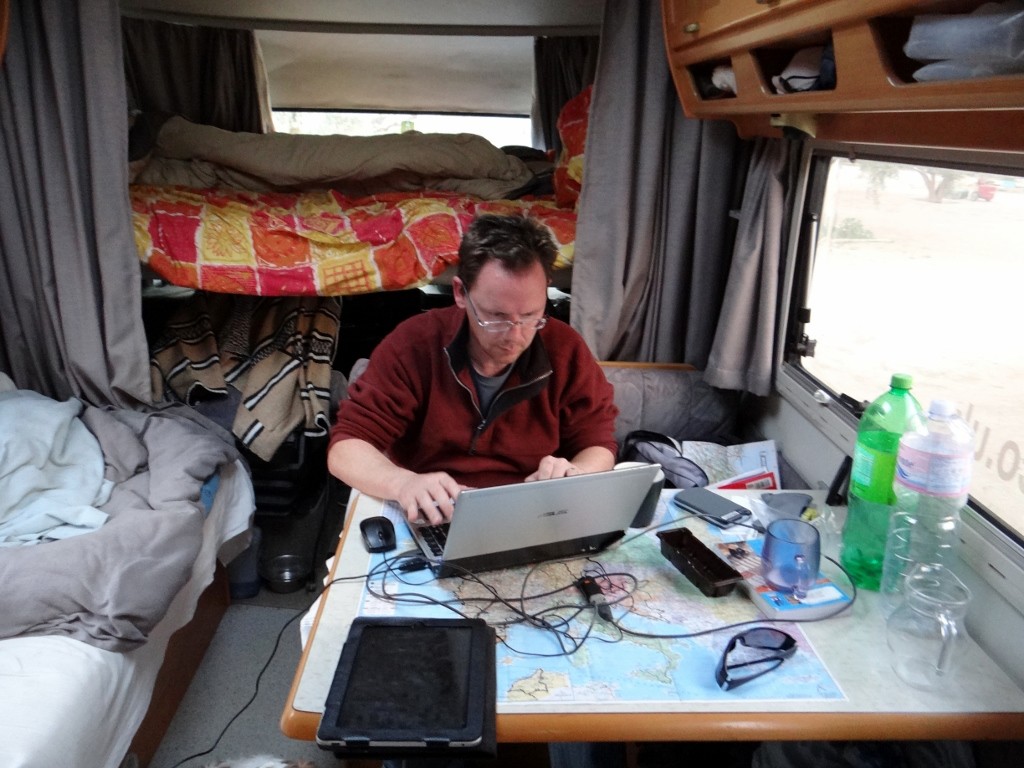
Right-o, that’s the end to this post! It would be very interesting to hear from you on how you’ve funded your own motorhome touring or how you plan to fund your travel aspirations. Drop us a comment below, we read ’em all as do plenty of other folks who I’m sure will be interested and find your thoughts helpful.
Cheers, Jay

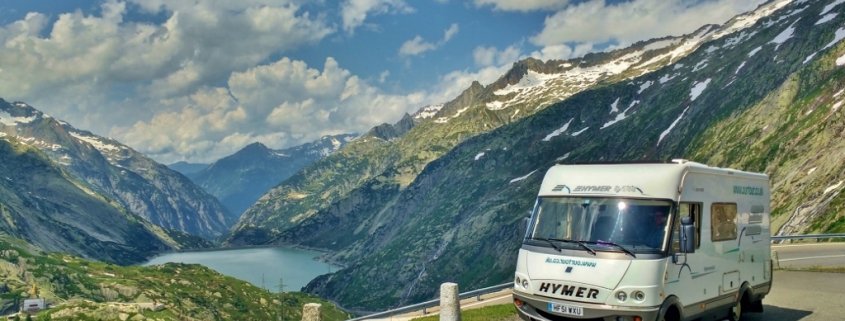
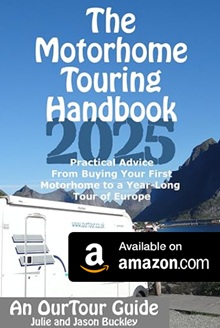



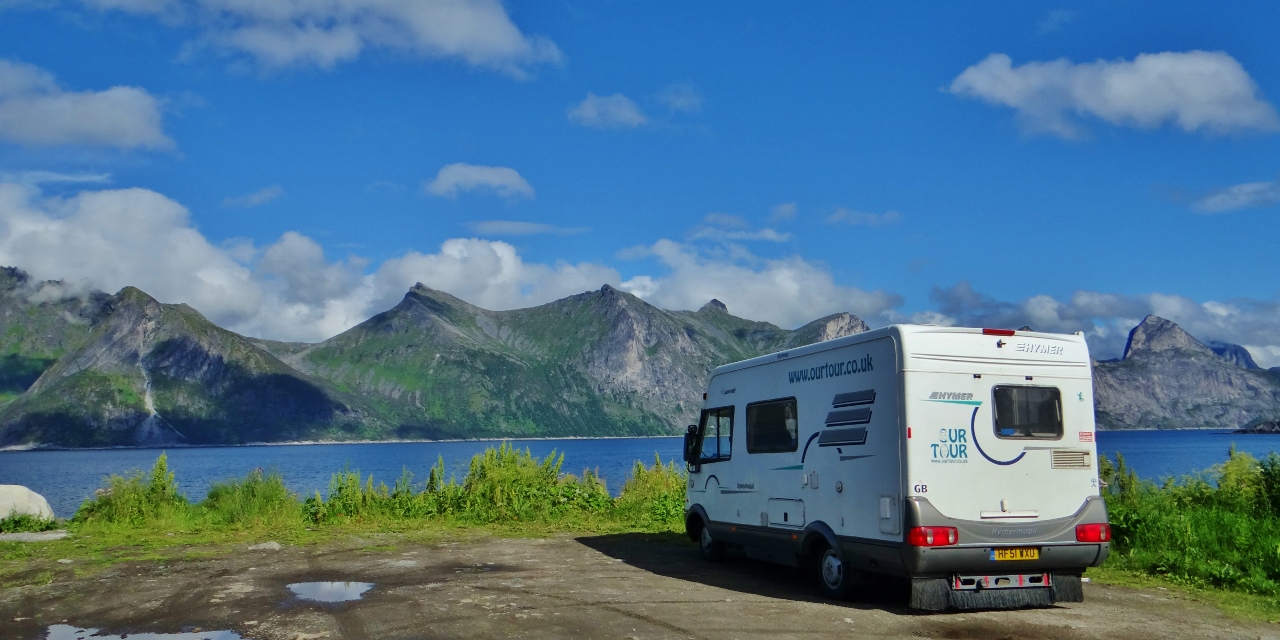




Hi Jay
Another great selfless blog post. I hope people realise that’s there other options to live than the traditional 9-5 to 65.
I’m firmly in the get to FI in a job that pays well, keeping expenses in check then do what you like, travel or work or whatever.
We have postponed our ‘retirement’ whatever that is to take an opportunity abroad, feels kind like a holiday still after 4 months.
But we wouldnt be here if we hadn’t found that video of a heavily accented (we can’t talk we are Irish) English man and his better spoken wife sitting in the couch in the cooler, drinking tea
, talking about FI. From that we found MMM and are much happier as a result.
Campervanless at the mo, because they are just too expensive if you aren’t using them a lot. I read that post too.
Better shut up here….good work though.
Great stuff Simon, thanks for the kind words and best of luck fella. Jay
Hi Jay, another interesting post, thanks.
I’d echo your comments on the digital nomad lifestyle. The other partner can quickly get frustrated/bored. If you’re moving on regularly, the impact on travel arrangements is sometimes bigger than might be expected too, in our experience.
In my view, another possible problem with some kinds of digital nomad work is that it may be harder to maintain your effectiveness when working part time than when working full time.
What I mean by this is that when you’re working full time everyday, you keep on top of research, ideas, news, etc relating to your work. This is usually unpaid, but relevant to your paid work. If you’re trying to compress your paid work into to 2-3 hours every other day (for example), then this background work tends to be neglected. Losing this background familiarity can gradually cause you to slip behind and get out of the loop. Your paid work may then suffer or take longer to complete.
In my experience, being a digital nomad would probably work better for a sole traveller, who wouldn’t mind holing up in a van or hotel room for a few days before having a few days off. Not very marriage-friendly!
Cheers,
Roland